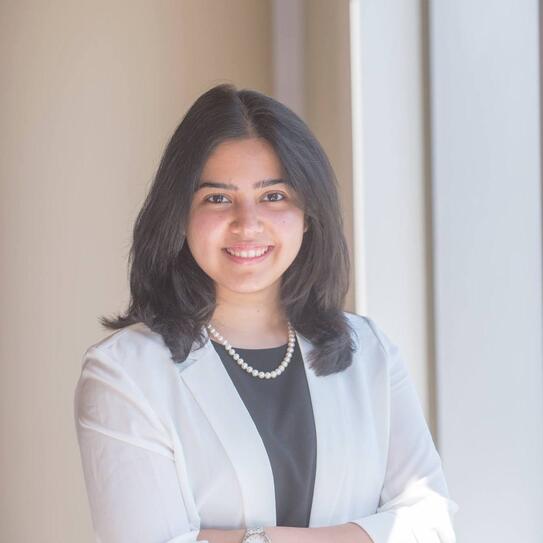Vrinda Mittal

Why did you choose to pursue a PhD in your discipline of Business?
I came into the program with an undergraduate degree in Economics and a Master of Finance, and worked at NERA Economic Consulting in the Finance division. I took PhD courses at the Economics department of MIT and worked as a research assistant during my master’s at MIT Sloan School of Management. I have developed my interest in finance through these academic and industry experiences over time. I knew that I wanted to contribute to a better understanding of financial markets and the economy through research, for which I required a PhD.
Why did you choose to come to Columbia Business School for a PhD?
Columbia Business School has one of the best PhD programs in finance with an outstanding faculty. The finance faculty produce interesting research and push boundaries of the research frontier. I wanted to learn and work with them, and I am extremely happy that it has been an absolutely wonderful experience. Doing research in finance and being in New York City is always an added advantage. I have been able to speak and meet with industry professionals, and their insights have been extremely helpful in my research. Indeed Columbia is at the ‘very center of business’.
What type of research are you exploring?
I am interested in new forms of financial intermediation and real estate markets. In one of my papers, titled Flattening the Curve: Pandemic-Induced Revaluation of Urban Real Estate, I look at the impact of COVID-19 on real estate prices, and show individuals migrating away from cities cause prices and rents to decline in city centers and rise in suburbs across the U.S. We further estimate the time these shocks are expected to last, having implications for persistence of work-from-home. In another paper, The Effect of Stock Ownership on Individual Spending and Loyalty, I use data from a fintech company to quantify effects of receiving stocks from certain brands on spending of those brands, and show loyalty as a driver. In another project, I look at the impact of rise in investments by pension funds in non-bank intermediaries on firms’ leverage and cost of capital. I combine empirical reduced form methods with tools from the industrial organization literature to address interesting questions in these areas.
What’s your favorite part of the PhD experience so far?
My favorite part of the PhD program has been discussing and brainstorming research ideas with the faculty and my peers. The faculty at Columbia is very approachable and has guided me throughout. They have been there to guide me and show me the right direction in research at every step. At the same time, I have enjoyed research discussions with my peers through reading groups, seminars, and over lunch.
Which faculty member(s) and/or courses influenced you the most, and how?
Empirical Asset Pricing by Stijn Van Nieuwerburgh and Empirical Corporate Finance by Xavier Giroud have been my favorite courses at Columbia. These courses have taught me to apply tools learnt in the theoretical courses of the PhD program to real-world problems and shed light on interesting questions. They are exceptional mentors and colleagues, and have supported and guided me in my research at every step.
What has been your academic experience at CBS?
Columbia Business School has an extremely rich and stimulating research environment. My advisors and the entire faculty have been very forthcoming in discussing and guiding my research. In fact, faculty in other divisions of CBS like Economics and Accounting, and in the Economics Department at Columbia University, have also been very helpful, and conversations with them give me a different perspective on my project. This interconnectedness across departments via PhD seminars and pre-thesis seminars has been a wonderful way to know and interact with faculty from across divisions. I have enjoyed PhD happy hours and get togethers between faculty and students, which fosters a friendly environment in the department. The course content is rigorous and has prepared me well to be a confident and meticulous researcher.
What are your future plans and how has your PhD experience translated into growth in your career?
I plan to do research in an academic institution post my PhD and hope to make a significant contribution in my field of research. I am confident that the PhD program at Columbia is preparing me to be a good researcher. The courses provide a rigorous theoretical background, and the faculty seminar series, PhD student seminars, pre-thesis seminars, and most importantly faculty guidance provide a strong foundation.
What will you take with you from your CBS experience?
Hands-on guidance by the faculty during the research process, faculty seminars, interactions during coursework, both inside and outside the classroom, and a stimulating research work environment with faculty and peers are some of my most memorable experiences at Columbia Business School. I am grateful, honored, and privileged to have gotten the opportunity to be a part of this prestigious institution and program.